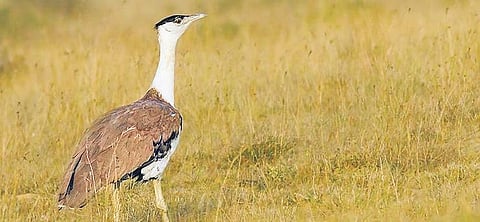

NEW DELHI: The Supreme Court directed the Rajasthan and Gujarat governments on Thursday to file their status reports on converting overhead electric cables into underground power lines, wherever feasible, within a year to protect the endangered Great Indian Bustard (GIB) from extinction.
A bench of justices DY Chandrachud, AS Bopanna and V Ramasubramanian directed both the states to file their compliance affidavits on an order of the court passed last year and the status reports within three weeks.
The top court also directed the committee constituted in accordance with the order dated April 19, 2021 to file a report on the progress made so far, the applications received on the issue of feasibility and the decisions taken on those.
The bench said the Centre's application for modification of the April 19, 2021 order and other intervention applications will be taken up for hearing after three weeks, once the court has an idea about what development has taken place since the passing of the order last year.
It listed the matter for further hearing after three weeks.
The apex court's order came on a plea moved by M K Ranjitsinh, a retired IAS officer, and others filed through advocate Sonia Dube, seeking the court's directions for an urgent emergency response plan to protect and ensure the recovery of numbers of the endangered species of GIB and Lesser Florican (LF).
On April 19 last year, the top court, in a bid to save the GIB, directed the Gujarat and Rajasthan governments to convert overhead electric cables into underground power cables, wherever feasible, within a year.
It had set up a three-member committee to assess the feasibility for the laying of high-voltage underground power cables.
The committee comprises scientists Rahul Rawat, Sutirtha Dutta and Devesh Gadhavi, deputy director of Corbett Foundation.
"The committee may also obtain technical reports, if need be, from experts in the field of electricity supply to arrive at their decision. The Government of India shall provide all assistance to the committee," the top court had said.
It had also directed that the work for laying the underground power lines shall proceed right away where there is no doubt about its feasibility.
"However, in cases where the respondents find that there are issues relating to feasibility, the matter shall be referred to the committee with all relevant material and particulars.
The committee shall assess the matter and arrive at a conclusion as to whether the underground power lines are feasible or not.
Based on the report to be rendered by the committee, further action shall be taken by the respondent," it had said.
The apex court had said in all such cases where it is found feasible to convert overhead cables into underground power lines, the same shall be undertaken and completed within a year.
"In all cases where the overhead power lines exist as on today in the priority and potential GIB area, the respondents shall take steps forthwith to install diverters, pending consideration of the conversion of the overhead cables into underground power lines.
"In all such cases where it is found feasible to convert the overhead cables into underground power lines, the same shall be undertaken and completed within a period of one year and till such time, the diverters shall be hung from the existing power lines," it had said.
The top court had said the states as well as the Centre have a duty to preserve the endangered species and as such, the expenses incurred will have to be provided by them either under the schemes available or by earmarking the same in such a manner.
"Needless to mention that in the instant case, the preservation is by undergrounding the power lines and in that context, if cost is incurred, it would also be permissible to pass on a portion of such expenses to the ultimate consumer, subject to the approval of the competent regulatory authority," it had said.
With regard to the conservation of the habitat to secure the safety of the eggs laid by the birds, the court had also directed that certain areas be fenced and protected from invasion by predators so that the eggs laid in these areas are protected.
"In addition to the death of the birds due to collision and electrocution, the conservation strategy also requires protecting the eggs of the said species of birds and the same being transferred to breeding centres for the purpose of hatching," it had said.